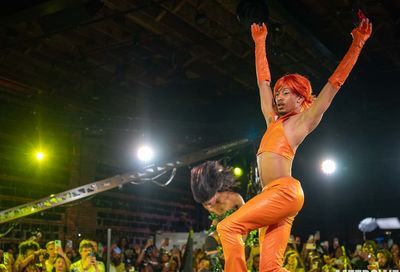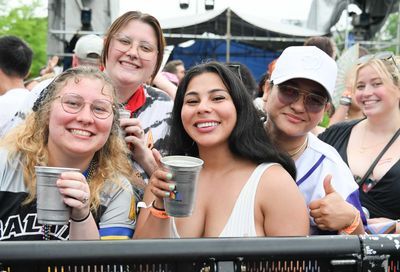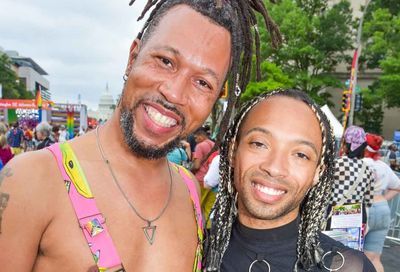Chely Wright
Her journey from the country closet to the Pride Festival stage
When Chely Wright first took the stage at Nashville’s Grand Ole Opry in 1989, the young country singer from Kansas was fulfilling a childhood dream. But the experience didn’t come without a touch of stage fright that she navigated with a little help from the legendary Roy Acuff, who asked, ”Would it feel better if I stayed out there with ya?”
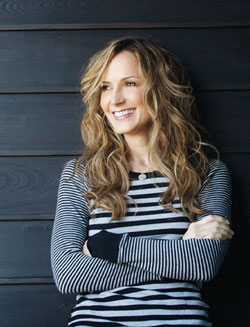
Chely Wright
(Photo by Michael Granberry)
So there sits Acuff in the background of photos of Wright’s first foray at the Opry, sitting on a stool providing that extra touch of support for a rising star.
Since then, Wright’s made many, many more appearances on the Opry stage.
”It’s an absolute knee-shaking, chill-bumpy, heart-pounding thrill every single time a country-music singer who grew up dreaming of it gets to stand on that stage,” she says, still conveying that bit of awe never dulled by years of performing. ”It’s the most humbling experience you could ever have.”
Wright is taking on another first on Sunday — as the headline performer at the Capital Pride Festival. It’s the latest stop in a journey that’s taken her from the country-music closet she built for herself to a new prominence as the first major country artist to come out as gay. Perhaps best known in pop circles for her hit ”Single White Female,” Wright is part of the Nashville country music firmament, which makes her coming out a major event in a musical genre known for its conservatism, in both artists and fans.
With a new album, Lifted Off the Ground, and an autobiography, Like Me: Confessions of a Heartland Country Singer, Wright’s determined to forge ahead as a country artist in her newly open life, despite knowing that some fans may — in fact, some already have — choose not to join her there. The new album, she notes, was already being recorded when she made the decision to come out, so there’s much for her and her fans — new and old — to look forward to.
”Spending a portion of every hour of every day trying to hide such a big part of me, that’s a big job. And with that off my back, I’ve got so much more time to be creative and not think about tending to my secret.”
When she takes the stage on Sunday afternoon, Wright may not have a country-music legend sitting behind her for support, but she will have a huge audience of LGBT people standing in front of her ready to hear her perform as a openly lesbian singer — a new experience for her and her fans, and one she’s eager to have.
”I think I’m going to have a pretty big time.”
METRO WEEKLY: It’s only been a few weeks since you came out. What’s been the biggest change for you over the past month or so?
CHELY WRIGHT: Well, aside from the hectic schedule — I have an album and a book so it’s been inherently just kind of nutty — the biggest change for me is that my stress level has gone so far down. I know that comes as a great shock to some people. I’ve gotten a lot of e-mails from straight people in my industry that have said, ”Hey Chely, I wanted to reach out and support you during this difficult time.” This is not the difficult time. Chaotic and busy, yes. But the difficult time was the past 16 years of my career in hiding. The getting here was hard, the being here is really quite magical.
MW: You’ve been getting e-mails saying ”we want to support you through your difficult time” — but those people are sending you e-mails. How has the reaction been within the country-music industry?
WRIGHT: I have received hundreds of e-mails from industry people — radio disc jockeys, program directors, promotion people, record-label folks, publicists — saying, ”You go girl, we’ve always loved you, what a courageous step.” The industry at large has been incredibly supportive, and the artists that matter to me have reached out. I know there are some negatives out there, it’s just I don’t know what they’re saying because I’m really not reading those. Of course, some of that is seeping in. A friend from high school said, ”Don’t pay attention to the negative crap out there on the Internet,” and then she cut-and-pasted the negative blog into the e-mail. [Laughs.] I’m like, why did you do that? But it stings less than I thought it would.
MW: My feeling has always been that there’s a more intense connection between country music and its fans than there is with a lot of other pop music. Is that an accurate point of view?
WRIGHT: There’s a special and unique connection with the fans and artists in country music that is paralleled by no other. We become a part of their family, and country fans become a part of ours. One of the reasons why it has been so incredibly scary for any country artist to step forward [as] being gay is that when anyone comes out their abiding fear is what their family will think about it, and country music fans are essentially our family. I know that my managers are getting e-mails from fans that are saying goodbye. On the other hand, there are people saying, ”Hey, I never was a fan of yours before, but now I am.” So, we’ll see. Time will tell what happens.
MW: When you were a young country-music fan, what was it that you got from your country-music idols that made you feel like you were a part of a family?
WRIGHT: I knew what they were talking about. I mean, Loretta Lynne was singing, “my daddy works all day in the Van Lear coal mines.” My dad was a construction worker [and grew up with] dirt floors. We hauled firewood in, we didn’t have air conditioning. I felt like they knew me and I knew them. And the couple of country music artists that I met when I was a young kid, Jim Ed Brown and Helen Cornelius, they just felt like people I knew. After their shows they’d stand outside of their bus and sign autographs and eat a piece of corn on the cob and talk about farming with the local farmers.
MW: Knowing that you’re losing part of a fan base that has that emotional connection to your music, but that you’re gaining a fan base that has a different type of emotional connection, how do you process that as an artist?
WRIGHT: I’m a musician and I’m going to make the music I make. If my being gay is what attracts them to me and that’s why they want to know me, I would hope that my music will be pleasurable to them. It will be really kind of tragic if they go, ”Oh shoot, we don’t like that music.” That would completely suck because that would be a double whammy. But I knew that this could very well be the end of my having a career in the way that I’ve had it. I knew it, I signed up for it, I’m fine with it. People can dislike me in truth, because having them like me in non-truth was killing me.
MW: Is country the music you’ll make regardless where your career goes, or would you consider changing your style if you find yourself losing your audience?
WRIGHT: When you start creating art based on who you think might show up, that’s a problem. I talk in my book quite a bit about betrayals of myself, that I could no longer commit to being gay and hiding that — I think if I say I’m through with country music, that would be a betrayal of myself. At the root of who I am, I’m a country singer from Kansas.
MW: You’ve toured a lot, you’ve played for troops in Iraq, you’ve been all over the country, but this will be your first time playing for a gay and lesbian specific event when you come to D.C. for the Capital Pride Festival. How do you expect that it might be different for you as a performer?
WRIGHT: Well, I’ll be pretty emotional. It’s going to be a huge celebration. I’m just hopeful that people in the audience have as much fun as I think I might. It’s gonna be really fun to sing these songs in full disclosure. I’m out and I’m seriously proud to be out.
MW: Have you been to a big gay event like a pride in the past?
WRIGHT: I went to New York City Pride two years ago, and I cried like a baby.
MW: You weren’t out at that point. Did you just kind of walk by and take a look, or did you delve into it?
WRIGHT: I went with my best friend, Chuck, and stood on the sidewalk and watched and cried at the PFLAG float. I loved it, it was really emotional.
MW: The PFLAG contingent always seems to be the one that really grabs people at their first pride parade. I know you had Christian upbringing in Kansas. How has your family been?
WRIGHT: They’ve been great. I really believe that the secret to understanding the gay community is that if we can attach faces to that tiny word ”gay,” that has so much power it can change everything. As my dad says, when it’s a ”they and them” issue, that word ”gay” has so much power. But when it’s your kid, or your sister or your brother, that word just loses all of its big scariness. My dad called me a couple weeks after I told him and said, ”Chel, I’ve been doing a lot of thinking, and I’ve really had to rethink what that word means. My whole life I’ve been taught that word meant sick and perverted and the devil’s work.” And he said, ”I had to really rethink that because I don’t know a better person than you.”
MW: A lot of us agonize over how we come out to our families. How did you actually do it?
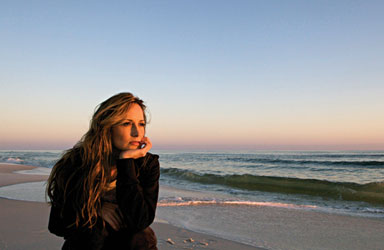
Chely Wright
(Photo by Michael Granberry)
WRIGHT: I finally realized I had to tell my father because he called me at one point in Nashville and said, ”Chel, we’re not close like we used to be. Have I done something wrong?” That just ripped my heart out. When you hide you start to live separate lives. You don’t share your life the way that you want to, because you have a secret.
So I had a show coming up in his home town and I got on my tour bus from Nashville and I laid awake in my bunk thinking, ”You’re gonna tell him, you’re gonna tell him, you’re gonna tell him.” When he got to my hotel room — he always likes to come hang out with me as I’m getting ready for a show — I said, ”Pippy, I need to talk to you.”
He said, ”What’s wrong? You’re sick? You have cancer?”
I said, ”I don’t have cancer, but I need to tell you something I’ve needed to tell you my whole life but I’m scared and I’ve always been afraid you won’t want to be my dad anymore.” And I said, ”I’m gay.”
So we had a two- or three-hour conversation about it. It ran the gamut of emotion. He kept saying, ”Why didn’t you tell me? I’m disappointed that you didn’t know I’d love you no matter what.” And I said, ”Dad, don’t you remember the gay jokes? You know, the jokes at the dinner table?” He buried his face in his hands and he just sobbed and said, ”I’m sorry, I didn’t know.”
I asked him, ”Dad, do you love me even though?” And he grabbed me by both shoulders and he said, ”Do I love you even though? Kid, I love you because.” He was very emotional and he took his concrete-spattered hat off of his head and he said, ”If I’ve learned one thing in this life, if you try to be something you’re not, you won’t be very goddamn good at it.”
That’s a hard conversation to have with a man who was raised to believe that gays are sinful and wrong and condemned to hell. In that very instant, when the kid that he knew and loved and respected and admired and adored, told him that’s who I was, everything about that word changed for him.
MW: Has that impacted your father’s life back home?
WRIGHT: Of course. You know, I’ve got a community of gay support. It’s one thing for my family to support me, but when they go back into their world of small town and mid-America it’s tough. My dad said a guy came to pour some gravel out for his driveway. They’ve got a little stone out by their driveway that says ”Wright,” and the guy said, ”You’re not any relation to Chely Wright?” And my dad said, ”I’m her dad.” And the guy said, ”What do you think about that?” And my dad said, ”What do you mean?” And the guy said, ”Well, that’s a sin.” And my dad said, ”All I know is my daughter’s a good person, and there ain’t nothing changed about that.”
Here’s one of the most disturbing things that happened. My sister and I are very, very close, and she lives in a town of 400. She said that her preacher came to her house last Friday and said, ”Jenny, I need to tell you that on Sunday I’m going to be preaching a sermon on homosexuality.” She said, ”Really? Okay, well, don’t look at me when you do it.”
When that preacher got up in front of the congregation — which, by the way, my nieces and nephews were sitting in the pews — he got a dry-erase board up and drew some graphs and stick figures and lines and arrows, and equated gays with murderers.
MW: Wow.
WRIGHT: That’s what we’re dealing with. Jen said it was all she could do to not break down and cry. Her 12-year-old son Max just kept looking up at her and saying, ”Momma?” I can take people disparaging me and nasty phone calls coming into radio stations when I’m on the air, but to know that a preacher is up there telling my nieces and nephews that their Aunt Chely is the same as a murderer really, really upsets me. That’s a problem for me.
MW: Does that affect how you feel about religion in general or your own personal religious beliefs?
WRIGHT: It doesn’t impact my relationship with God in the least. It speaks volumes, however, about the work that needs to be done in churches in America. That’s why I’m on the board of Faith in America, an organization that takes on and holds responsible churches who do damage to young minds by telling them that they’re damaged goods. There’s a lot of bigotry going on. I understand we want to tell young people: try not to be an alcoholic, try not be a drug abuser, try to be mindful of the ways in which you share your body with partners, try to be a wholesome person. But I do not like a church telling a young person [to] try not to be a gay person, because we’re born that way. I was born this way, and I’ve yet to meet another gay person that says that they weren’t.
I’m so fortunate that my relationship with God has never waned. In fact, I would have pulled the trigger, I would have killed myself had I not been delivered from that pain by the grace of God.
MW: You’ve talked and written about getting to the point of suicide, and obviously getting very close. Is your relationship with God the thing that kept you from taking that final step?
WRIGHT: It was wholeheartedly my relationship with God. It’s been a powerful thing in my life since I was a little girl. But one of the things that is beautiful about being a follower of God is that sometimes it’s active and compelling in your life when you don’t even know it. I did have a loaded weapon in my mouth and I was ready to pull the trigger. No, I didn’t hear a booming voice saying, ”Do not do this child of mine.” I didn’t see a guy in a robe. But I know that I was ready to end it — I was a somewhat known country-music singer and also a lesbian and I didn’t know how to make those very real parts of me intersect. I had no hope and I was ready to give up. And for whatever reason, I didn’t pull the trigger.
I went upstairs and out of just sheer emotional exhaustion I fell asleep. I got up the next day and I was afraid to go downstairs where that gun was. I got on my knees in my bedroom and instead of praying to God to help me figure out a way to make this career work with my secret, my prayer was different. It was, ”Dear God, please grant me a moment’s peace.” And the minute I said, ”in your name I pray,” I had it. It was as though someone poured a gallon of peace over me.
I realized, holy crap, that’s what I’ve gotta do. I’ve gotta stop praying to do it my way. I’ve been trying it my way for 36 years. I felt as if God said, “Okay, now we’re gonna do it my way, and my way is what I’ve been telling you for a long time: You’re going to tell the truth.” My life got downright magical from the minute I decided to just give in to my truth without knowing what might happen, without knowing that I may or may not have a career. When you have a gun in your mouth and you don’t pull the trigger, the rest is extra.
MW: A lot of gays and lesbians who’ve had difficult experiences with churches and religion, like what your sister just went through, tend to shy away from religion. How have people reacted to you as an openly gay person with a really strong religious faith?
WRIGHT: One of my really good friends is a lesbian in Oklahoma City. She explained to me that she hated going to church — she wished she could go but she knew the minute she walked in the door she was less than. She wasn’t part of that club. And who wants to attend that club meeting? Nobody wants to go to that club meeting where you know that you really don’t ever get to fit in. It’s human nature to want to build a wall and throw a finger up at that. I get that.
I was lucky that I kind of believed there were two Gods: the one at church they were telling me to fear, that was going to burn me up in this fire; and then the one who gave me my music, that was always with me, not just on Sunday mornings. I was one of the fortunate few who never felt alone. But it’s reasonable for young gays and lesbians, in my opinion, to develop an aversion to religion and church and fellowship. And that’s why I’m so frustrated with churches who automatically exclude young gays and lesbians. And old ones for that matter. How dare they assume they own God?
I’ve received thousands of letters — handwritten and e-mailed — from gays and lesbians who are so excited that there is another out gay person that is talking about her spirituality. I am not the only out gay person who is a vocal Christian or a vocal spiritual person. The community of gay people who are very faithful to their religion is huge and I think it’s really exciting to watch the gay community reclaim their place in the church. It’s about time that we decided, hey, straight people don’t own God. We get to have God, too.
MW: You’ve mentioned your nieces and nephews, and you seem really close to them. How did they handle your coming out?
WRIGHT: Max was the only one that we told early — his mother told him last year. The two younger ones were told just a couple of days before my coming out publicly. And the 6-year-old was cute — someone asked him, ”Henry, do you know why Chely’s on TV and in the magazines?” He shrugged his shoulders and said, ”’Cause she gay.”
Amelia, who’s 8, they gave her the People magazine issue — I haven’t read it, but I understand it covers my being gay and that I almost killed myself — and they had her read it. She called me after she read it, and I said, ”Well, what’d you think, Picklehead?” And she said, ”The pictures were pretty.” I asked her how she felt about what she read, and she said, ”Well, the fact that you might want to marry a woman that doesn’t shock me, but the thing that upset me the most is that you had a gun.” And I thought, if an 8-year-old can metabolize that that’s the worst thing about that article, that’s good. That’s progress.
So Max, the 12-year-old, though — this is how far along the rhetoric gets by the time you’re 12 in Kansas. Jenny and Max were walking on a gravel road and I guess some guy passed in a pickup truck and Max said to his mom, ”That guy likes little boys.” And Jenny said, ”What do you mean?” And Max said, ”That guy’s gay.” And Jenny said, ”Are you sure you know what you’re talking about? Have you heard that he’s touched a little boy?” And he said, ”No, but I know he’s a homosexual.”
Jenny told him you need to be careful what you’re saying because that’s not the same thing and that there are gay people that you know. Max said, ”Who do we know that’s gay?”
And she got upset and cried, and told him, ”Aunt Chely’s gay.” Then he started to cry and she asked him why. He said, ”Because I think people are going to pick on her.” And he’s right, you know. He’s right. There’s kind of a little bit of a problem back there in the Midwest right now about my coming out.
MW: Do you think that that will pass? I mean, obviously you will lose some people, but do you think that a lot of people will come along?
WRIGHT: Well, my objective isn’t to not lose fans. My objective is to make sure that that 13-year-old kid sitting in his bedroom in Kansas feeling like an alien will feel less alone knowing that the former Kansan of the Year is gay. It’s okay with me if I lose fans if it initiates a dinner-table dialogue. As far as my career goes, I’ll be okay. But again, when you have a gun in your mouth, these are bonus days.
Obviously, people in Nashville had heard the rumor for years that I am gay or might be gay. So people say, ”Oh, we knew that in Nashville.” With all due respect, I didn’t come out for the people who thought they knew. I came out for the people who certainly never, ever would have heard this. Because rumors never make it to print. Rumors never make it on the airwaves of the Lexington, Ky., radio station. I did this because I don’t want to be a rumor. I wanted to make sure that this rumor became a fact. I don’t want to be a whisper anymore.
Chely Wright headlines on Sunday, June 13, on the Capital Pride Festival mainstage, at the intersection of 3rd Street and Pennsylvania Avenue NW. She is scheduled to appear sometime between 5 and 6 p.m. For more information, visit capitalpride.org. Her album, Lifted Off the Ground, and her memoir Like Me, are now available for sale in stores and on line. For more information, visit chely.com.
Support Metro Weekly’s Journalism
These are challenging times for news organizations. And yet it’s crucial we stay active and provide vital resources and information to both our local readers and the world. So won’t you please take a moment and consider supporting Metro Weekly with a membership? For as little as $5 a month, you can help ensure Metro Weekly magazine and MetroWeekly.com remain free, viable resources as we provide the best, most diverse, culturally-resonant LGBTQ coverage in both the D.C. region and around the world. Memberships come with exclusive perks and discounts, your own personal digital delivery of each week’s magazine (and an archive), access to our Member's Lounge when it launches this fall, and exclusive members-only items like Metro Weekly Membership Mugs and Tote Bags! Check out all our membership levels here and please join us today!





















